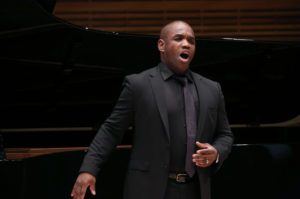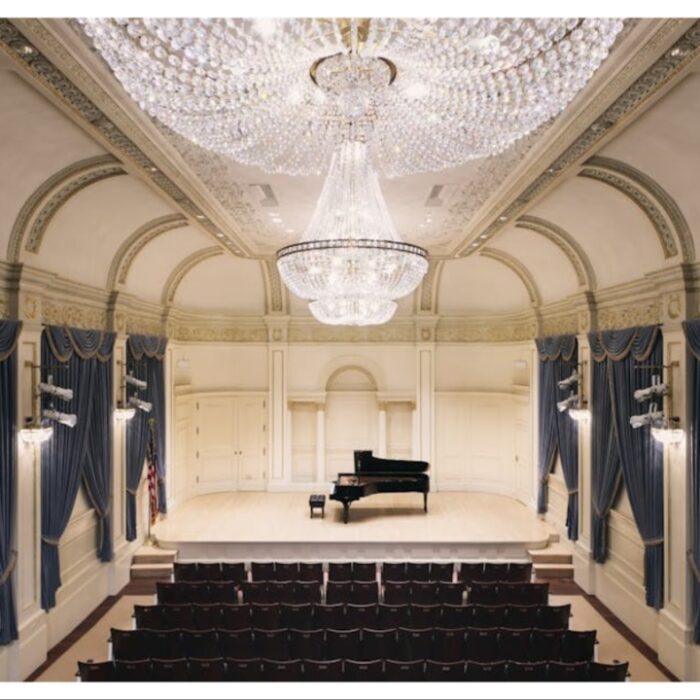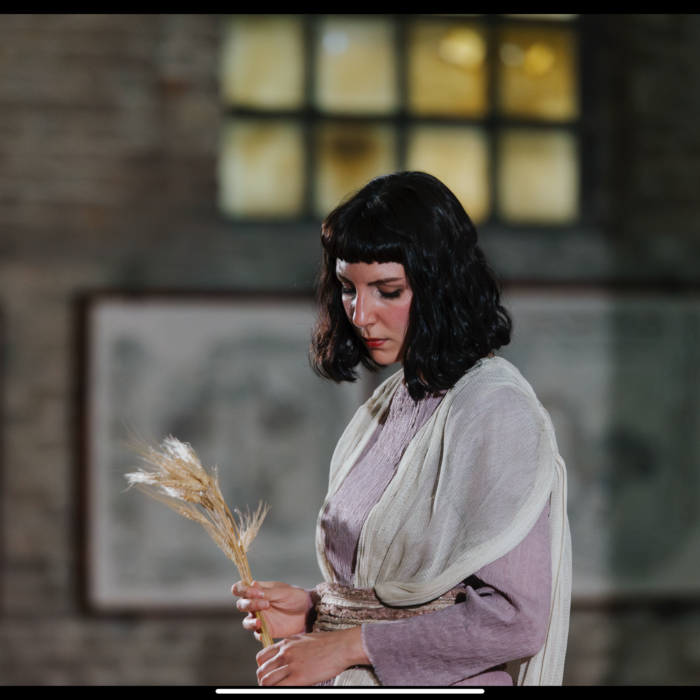
Carnegie Hall 2017-18 Review: Lawrence Brownlee Bares All With New York Premiere of “Cycles of My Being”
By Logan MartellBeing one of the leading tenors in the operatic world, Lawrence Brownlee is no stranger to interpreting works of art and lending them his own brand of beauty and meaning. On April 24, Brownlee took to Carnegie Hall to deliver a performance nearer and dearer to his heart, and one that places a firm finger on the pulse of tensions within the country. According to Brownlee: “The ideas, themes, and experiences that makeup ‘Cycles of My Being’ have been on my mind for quite some time. As I’ve watched men of color endure undeserved aggression, incarceration, brutality, and even death, I’ve been forced to consider my thoughts and questions about what it means to be a black man in America today, and how we as a people are viewed and treated.
Working with Terrance Hayes and Tyshawn Sorey, two extraordinarily insightful and talented black men at the pinnacle of their respective art forms, has allowed each of us to bring our different perspectives to this piece, and find common ground in both our shared cultural history and the unique individual paths that have brought us to this point. Together we have tried to create something that speaks to the day-to-day life of a black man in the United States, and the thoughts and questions he experiences as he moves through the world.
These are divided times, but the goal of this piece is neither to widen those rifts nor reopen old wounds. The goal is to foster mutual respect, understanding, and communication across races and generations. History unfolds in cycles, and with this work, we hope to balance the stark challenges of our present reality with a resolute resilience and an unwavering hope for a better future.”
A Classical Start
Brownlee started the evening’s musical journey with Robert Schumann’s “Dichterliebe, Op. 48,” handling the beginning stanzas of “Im wunderschonen Monat Mai” with a soft and refined clarity. This continued until the third poem “Die Rose, die Lilie, die Taube, die Sonne.” The tempo leaped forward and Brownlee pattered his way through the romantic lyrics before a sudden break in tempo with the next poem.
Things took a heavier turn at “Im Rhein, im heiligen Strome,” which describes the reflection of Cologne cathedral in the waters of the Rhine. Brownlee’s lofty tone underscored by the flowing, cautious rhythm played by Myra Huang painted well the junction of sea and sky. After a moment to clear the air, Huang resumed in a cantabile-style for the melancholic “Hor’ ich das Liedchen klingen.” Brownlee’s closing phrase of “Vague longing drives me up to the high forest, where my immense grief dissolves into tears” mark a low point in the narrative of the poems, almost comically leapt out due to Brownlee’s joyful abandon as he detailed a love triangle detailed in the bouncy “Ein Jungling liebt ein Madchen.”
Baring it All
The second half of the evening made for the New York premiere of “’Cycles of My Being.” After an opening spoken poem by librettist Terrance Hayes, Brownlee began with the first of the five songs “Inhale, Exhale,” which began and ended in vulnerability borne by the question “Do you love the air in me as I love the air in you?” The second song “Whirlwind,” was filled with dissonant chords from the piano, and creeping minor thirds from the clarinet. The lyrics spoke of a desire for agency in the chaos of the world and a desire to share and express one’s inner gifts. “This song of mine must become a weapon,” Brownlee cries out in the upper reaches of his instrument before the slightest of pauses is followed by a vocal plunge much like the fall of a hammer.
This atmosphere made for a seamless transition into the next song “Hate,” a reflection on just that, underscored by powerful musical effects, such as the scornful bowing from the violin and cello with the phrase “hate wears white sheets.” The piano in this number was scarce as hurried chords disappeared into uneasy silences. Having delivered everything until now with a polished lyricism, it came as a surprise to hear the bluntly-spoken line “You don’t know me. Still, you hate me.” This was followed by a recitative-like line: “Your contempt for me does not allow you to see me for who I am.” I found it fitting that this statement of blindness was mirrored by a lack of any real melody.
The next song, “Hope,” started with swift arpeggios from violinist Randall Goosby. “When weary, hope is a hymn. When uninspired, hope is a vision.” Following this pattern from start to finish, Brownlee illuminated the lyrics with superb phrasing, bestowing each “is” with its own import. The text itself states the almost countless forms hope can take on, doing so through sheer excess. This was one of the longer numbers, emphasized by the seeming lack of a tangible direction, but after the last of the examples that hope can be anything, there came the statement that hope was indeed everything.
Finally, Brownlee brought things to a close with “Each Day I Rise, I know.” The bel canto tenor letting loose with soaring melismas as the others on stage joined in with a steady chorus of “I know”s. His spirited singing seemed at odds with the groggy, half-asleep syntax of the lyrics which brush over the common sights of the early morning with a dreamy gloss, but it sounded like Brownlee had indeed brought some magic with him into the waking world. Similarly, Tyshawn Sorey and Terrence Hayes’ work has poignantly captured a specific kind of the human experience, presenting these experiences in a way that best bridges the gaps between one person and another, allowing us to learn and grow.


